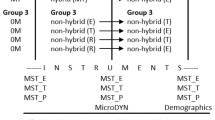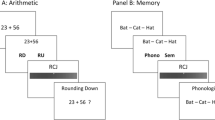Abstract
A consensus has emerged in recent years regarding the development and utilization of learning skills in early and middle childhood: Strategy use is limited by domain boundaries as well as by available knowledge within each domain (cf. Weinert & Kluwe, 1987). A comforting result of this consensus is that the commonplace failure to find strategy transfer—which has plagued the field of cognitive development for two decades (Borkowski & Cavanaugh, 1979; Campione & Brown, 1977)—is much less problematic. That is, the relentless search during the 1970s for the widespread generalization of learning skills is rendered less feasible and, perhaps less interesting, by research and theory on the domain-specificity of strategy use.
Access this chapter
Tax calculation will be finalised at checkout
Purchases are for personal use only
Preview
Unable to display preview. Download preview PDF.
Similar content being viewed by others
References
Asarnow, J., & Meichenbaum, D. (1979). Verbal rehearsal and serial recall: The mediational training of kindergarten children. Child Development, 50, 1173–1177.
Belmont, J. M. (1978). Individual differences in memory: The cases of normal and retarded development. In M. M. Gruneberg & P. Morris (Eds.), Practical aspects of memory (pp. 153–185). London: Methuen.
Belmont, J., & Borkowski, J. G. (1988). A group test of children’s metamemorial knowledge. Bulletin of the Psychonomic Society, 26, 206–208.
Belmont, J. M., Ferretti, R. P., & Mitchell, D. W. (1982). Memorizing: A test of untrained retarded children’s problem solving. American Journal of Mental Deficiency, 87, 197–210.
Borkowski, J. G., & Cavanaugh, J. (1979). Maintenance and generalization of skills and strategies by the retarded. In Norman Ellis’ (Ed.), Handbook of Mental Deficiency (2nd ed.) (pp. 569–617). Hillsdale, N.J.: Erlbaum.
Borkowski, J. G., & Kurtz, B. E. (1987). Metacognition and executive processes in special children. In J. G. Borkowski & J. D. Day (Eds.), Cognition in special children: Comparative approaches to retardation, learning disabilities, and giftedness (pp. 123–152). Norwood, NJ: Ablex.
Borkowski, J. G., Millstead, M., & Hale, C.(1988). Components of children’s meta-memory: Implications for strategy generalization. In F. Weinert & M. Perlmutter (Eds.), Memory development: Individual differences and universal changes (pp. 73–100). Hillsdale, NJ: Erlbaum.
Borkowski, J. G., & Peck, V. (1986). Causes and consequences of metamemory in gifted children. In R. Sternberg & J. Davidson (Eds.), Conceptions of giftedness (pp. 182–200). Cambridge, England: Cambridge University Press.
Borkowski, J. G., & Varnhagen, C. K. (1984). Transfer of learning strategies: A contrast of self-instructional and traditional formats with EMR children. American Journal of Mental Deficiency, 88, 369–379.
Brown, A. L., Bransford, J. D., Ferrara, R. A., & Campione, J. C. (1983). Learning, remembering, and understanding. In J. H. Flavell & E. M. Markwen (Eds.), Carmichael’s manual of child psychology (pp. 515–529), New York: Wiley.
Brown, A. L., Campione, J. C., & Barclay, C. R. (1979). Training self-checking routines for estimating test readiness: Generalizing from list learning to prose recall. Child Development, 50, 501–512.
Brown, A. L., & Palincsar, A. S. (1987). Reciprocal teaching of comprehension strategies: A natural history of one program for enhancing learning. In J. D. Day & J. G. Borkowski (Eds.). Intelligence and exceptionality (pp. 81–132). Norwood, NJ: Ablex.
Butterfield, E. C., & Belmont, J. M. (1977). Assessing and improving the executive cognitive functions of mentally retarded people. In I. Bialer & M. Sterlicht (Eds.), Psychological issues in mental retardation (pp. 277–318). New York: Psychological Dimensions.
Campione, J. C., & Brown, A. L. (1977). Memory and metamemory development in educable retarded children. In R. V. Kail, Jr., & J. W. Hagen (Eds.), Perspectives on the development of memory and cognition (pp. 367–406). Hillsdale, NJ: Erlbaum.
Day, J. D., & Hall, L. K. (1987). Cognitive assessment, intelligence and instruction. In J. D. Day & J. G. Borkowski (Eds.), Intelligence and exceptionality (pp. 57–80) Norwood, NJ: Ablex.
Dweck, C. S. (1975). The role of expectations and attributions in the alleviation of Learned Helplessness. Journal of Personality and Social Psychology, 31, 674–685.
Dweck, C. (1987), April). Children’s theories of intelligence: Implications for motivation and learning. Paper presented at the annual meetings of AERA, Washington, D.C.
Flavell, J. H., & Wellman, H. M. (1977). Metamemory. In R. V. Kail and J. W. Hagen (Eds.), Perspectives on the development of memory and cognition. Hillsdale, NJ: Erlbaum.
Hale, C., Turner, L., Rellinger, L., Bados, M., & Borkowski, J. G. (1988). The development of memory processes in retarded and nonretarded adolescents. Paper presented at the Gatlinburg Conference on Research and Theory in Mental Retardation, Gatlinburg, TN.
Kurtz, B., & Borkowski, J. G. (1984). Children’s metacognition: Exploring relations among knowledge, process, and motivational variables. Journal of Experimental Child Psychology, 37, 335–354.
Kurtz, B. E., & Borkowski, J. G. (1987). Metacognition and the development of strategic skills in impulsive and reflective children. Journal of Experimental Child Psychology, 43, 129–148.
Marsh, H. W. (1986). Verbal and math self-concepts: An internal-external frame of reference model. American Educational Research Journal, 23, 129–150.
Meichenbaum, D., & Goodman, J. (1971). Training impulsive children to talk to themselves: A means of developing self-control. Journal of Abnormal Psychology, 77, 115–126.
Pressley, M., Borkowski, J. G., & O’Sullivan, J. T. (1985) Memory strategies are made of this: Metamemory and strategy instruction. Educational Psychologist, 19, 94–107.
Reid, M. K., & Borkowski, J. G. (1987). Causal attributions of hyperactive children: Implications for training strategies and self-control. Journal of Educational Psychology, 79, 296–307.
Sternberg, R. J. (1985). Beyond IQ: A triarchic theory of intelligence. New York: Cambridge University Press.
Sternberg, R. J. (1987). A unified theory of intellectual exceptionality. In J. D. Day and J. G. Borkowski (Eds.). Intelligence and exceptionality (pp. 135–172). Norwood, NJ: Ablex.
Sternberg, R. J., & Davidson, J. E. (1986). Conceptions of giftedness. Cambridge, England: Cambridge University Press.
Weinert, F., & Kluwe, R. (1987). Metacognition, motivation, and performance. Hillsdale, NJ: Erlbaum.
Editor information
Editors and Affiliations
Rights and permissions
Copyright information
© 1990 Springer-Verlag New York Inc.
About this chapter
Cite this chapter
Borkowski, J.G., Turner, L.A. (1990). Transsituational Characteristics of Metacognition. In: Schneider, W., Weinert, F.E. (eds) Interactions Among Aptitudes, Strategies, and Knowledge in Cognitive Performance. Springer, New York, NY. https://doi.org/10.1007/978-1-4612-3268-1_13
Download citation
DOI: https://doi.org/10.1007/978-1-4612-3268-1_13
Publisher Name: Springer, New York, NY
Print ISBN: 978-1-4612-7942-6
Online ISBN: 978-1-4612-3268-1
eBook Packages: Springer Book Archive




